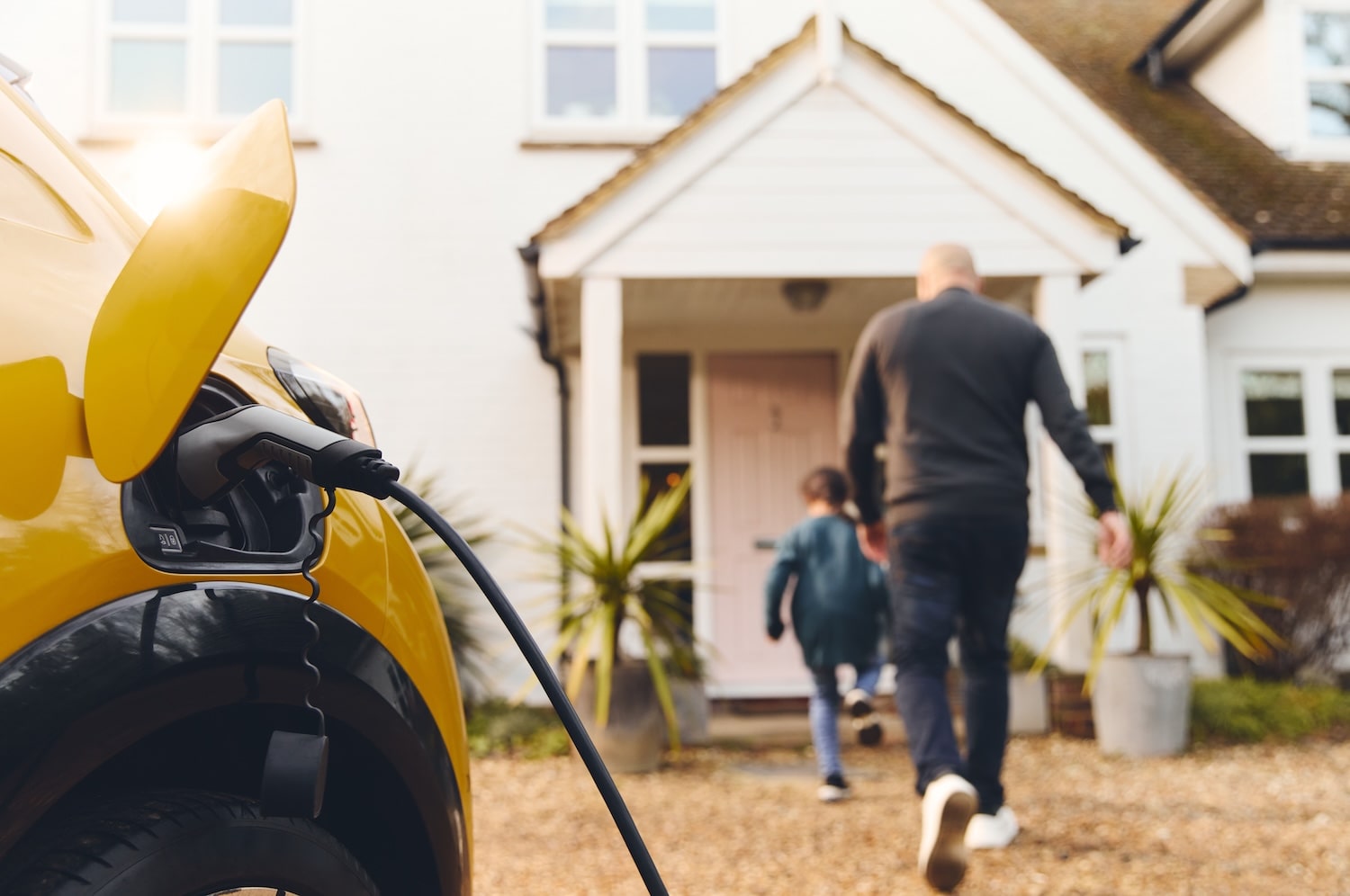
Electric cars are becoming more and more popular across the UK, especially with the government’s ongoing push towards cleaner transport, stricter emissions zones, and incentives for switching to electric vehicles. With that shift comes one big question: how do you charge them easily at home?
While you can plug into a standard socket, it’s slow, inefficient, and not ideal for long-term use.
That’s where a dedicated home EV charger comes in. It’s faster, safer, and much more convenient, giving you a full charge overnight and helping you take control of your energy use.
At Bolton Electrical Services, we install home and workplace EV chargers across Bolton and the North West, helping homeowners and businesses make the switch to smarter, greener driving.
Summary: Preparing for Home EV Charger Installation
- Installation Time: Most home EV chargers take 2–4 hours to install.
- Requirements: You’ll need a safe electrical supply, a suitable wall or mounting point, and Wi-Fi access for smart chargers.
- Location: Place your charger near your driveway or parking spot for easy cable reach.
- Who Installs It: Always use a qualified electrician. DIY installations aren’t safe or compliant.
- Aftercare: Once fitted, your charger will be tested, certified, and ready to use right away.
At Bolton Electrical Services, we handle the whole process, from checking your home’s electrical setup to full installation and testing, so you can start charging your EV safely and efficiently.
Why Install an EV Charger at Home?
Convenience and Speed
A dedicated home charger makes owning an electric car much simpler. Instead of waiting all day for a slow 3-pin plug to do its job, a wall-mounted charger can power your EV up to ten times faster.
Most people set their chargers to run overnight, taking advantage of cheaper off-peak electricity rates, so your car’s ready to go every morning without costing a fortune.
Safety and Efficiency
Home EV chargers are purpose-built to handle the demands of electric vehicles safely. They’re much more reliable than using a standard socket and include built-in protection against overheating or electrical faults.
That means less risk, less energy waste, and complete peace of mind every time you plug in.
Future-Proofing Your Property
Installing an EV charger isn’t just about convenience today, it’s an investment for tomorrow. As more people switch to electric vehicles, homes with ready-to-use chargers are becoming more desirable.
Modern chargers are also “smart,” meaning they can connect to your Wi-Fi, link with solar panels, and adapt to new time-of-use energy tariffs, keeping your setup efficient for years to come.
What to Do Before Installing an EV Charger
Check Your Home’s Electrical Capacity
Before installing an EV charger, it’s important to make sure your home’s electrical system can handle the extra demand. Most modern properties are ready for installation, but older homes may need small upgrades such as a new consumer unit or circuit breaker.
At Bolton Electrical Services, we carry out a full pre-installation assessment to check your supply, earthing, and fuse rating. This ensures your charger runs safely and efficiently from day one.
Choose the Right Charger Type
EV chargers come in different power ratings, typically 3.6kW, 7kW, and 22kW. Most UK homes use a 7kW single-phase charger, which strikes the perfect balance between speed and practicality.
You’ll also need to decide between tethered chargers (with a built-in cable) or untethered ones (where you plug in your own). Many homeowners prefer tethered units for convenience, while businesses often choose untethered options for flexibility.
If you want more control over your energy use, consider a smart charger that connects to Wi-Fi and lets you schedule charging during off-peak hours.
Pick the Ideal Installation Location
The best spot for your EV charger is somewhere close to where you park your car, with clear access to your home’s power supply.
Outdoor installations are very common, we use weatherproof chargers (IP65 or higher) that can handle the British weather with ease.
Our engineers will also help position your charger to keep cables tidy and avoid tripping hazards, so everything looks and works exactly as it should.

The Home EV Charger Installation Process
Step 1: Site Survey and Quote
Before anything is installed, one of our qualified electricians will visit your property to assess your setup. We’ll look at your fuse board, electrical supply, and possible cable routes to make sure everything meets current safety standards.
From there, we’ll provide a tailored quotation that includes charger recommendations suited to your vehicle, usage, and budget, so you know exactly what’s involved before work begins.
Step 2: Installation Day
On installation day, our engineers handle everything from mounting the charger to connecting it safely to your mains supply. We run all necessary cabling, perform electrical checks, and test the system thoroughly before switching it on.
For most homes, the entire process is completed within a single day, meaning you’ll be charging your car at home by the evening. Every installation is carried out by a fully qualified, NICEIC-accredited electrician, so you can trust that everything is safe, compliant, and neatly finished.
Step 3: Testing and Certification
Once your charger is installed, we complete a full round of performance and safety tests to confirm everything is working exactly as it should.
You’ll also receive official certification to prove that your system complies with UK wiring regulations and meets OLEV (now OZEV) standards for grant-approved installations. This documentation is important for insurance, warranty, and future resale value.
After Installation: Getting the Most from Your EV Charger
Connect to Your Energy Tariff or Smart App
Once your charger is installed, the next step is to make sure you’re getting the best value from it. Many home chargers can link directly to smart apps that let you monitor usage, set charging schedules, and even track costs in real time.
If your energy supplier offers an off-peak or EV-specific tariff, you can schedule charging for cheaper overnight rates, cutting your running costs without lifting a finger. We’ll show you how to set this up before we leave, so you can start saving straight away.
Regular Maintenance Checks
EV chargers are designed to be low-maintenance, but it’s still worth carrying out a quick visual inspection once or twice a year. Check that the cables are in good condition, the unit is secure, and there’s no visible wear or damage.
For extra peace of mind, Bolton Electrical Services can carry out professional maintenance and safety testing to make sure your charger continues to perform at its best for years to come.
Common EV Charger Installation Questions
How Long Does It Take to Install an EV Charger?
For most homes, installation takes between two and four hours. If your property needs extra work, such as a consumer unit upgrade or a longer cable run, it may take a little longer, but we’ll always let you know in advance.
Do I Need Permission to Install a Charger?
In most cases, no planning permission is required. Home EV chargers usually fall under permitted development rights in the UK. The main exceptions are listed buildings, flats, or properties with shared parking, where extra permissions or landlord approval may be needed.
Can I Install an EV Charger Myself?
No. EV chargers must be installed by a qualified electrician to meet safety standards and legal requirements. DIY installations can be dangerous and may void your warranty or insurance. Our engineers are fully accredited and ensure every installation complies with UK electrical regulations.
Can I Use My Charger in the Rain?
Yes, all professionally installed home EV chargers are weatherproof and perfectly safe to use outdoors. The units we install are built to IP65 or higher standards, meaning they can handle even the wettest Bolton weather without issue.
Why Choose Bolton Electrical for EV Charger Installation
Accredited, Experienced Installers
With over 50 years of electrical experience, we’ve built a reputation for reliable, high-quality work across Bolton and the North West. Our team is fully accredited and trained in the latest EV charging technology, helping homeowners and businesses make the switch to cleaner, smarter energy solutions with confidence.
Complete Service and Support
From your initial consultation and design through to installation and aftercare, we handle everything in-house. Whether you’re upgrading your home or adding EV chargers to a workplace, we focus on efficiency, safety, and long-term reliability.
We’re trusted by customers across the region for our attention to detail and our commitment to great service every time.
Frequently Asked Questions (FAQ)
How much does it cost to install an EV charger at home?
The cost to install an EV charger depends on your property layout, wiring, and charger type. Contact us today to get a quote.
Do I need three-phase power for a home charger?
No. The majority of UK homes use single-phase power, which supports chargers up to 7kW, fast enough for most drivers.
Can I get a grant for installing an EV charger?
Yes. Schemes such as the OZEV grant are available for landlords, commercial sites, and workplace installations. We can advise on eligibility and help you apply.
What’s the difference between tethered and untethered chargers?
A tethered charger comes with a fixed cable attached, offering quick plug-and-go use. An untethered charger uses a removable cable, giving you flexibility and a tidier look when not in use.
Is a home EV charger worth it?
Absolutely. It’s faster, safer, and more cost-effective than relying on public chargers or a standard 3-pin plug. Plus, it adds value and convenience to your home.
